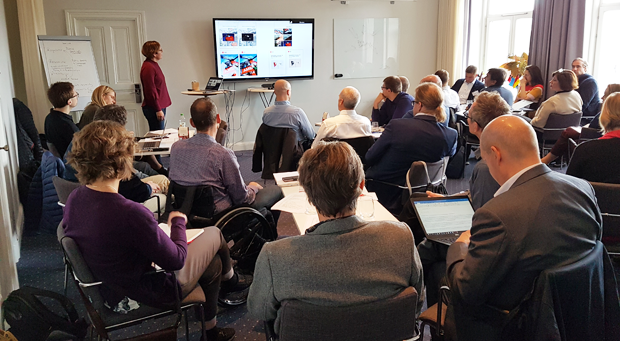During the Baltic Sea Director General meeting in May 2018, Sweden took the initiative to start a collaboration within Evidence-Based Civil Protection to share experiences from countries in the Baltic Sea region. The workshop was planned and conducted by the Swedish Civil Contingencies Agency (MSB) in collaboration with the DSB in Norway and the Ministry of the Interior in Finland. On October 10-11, 2019, practitioners, researchers, statisticians and policymakers met with others in Karlstad to exchange, learn and utilize each other’s experiences.
The program was divided into five different sessions with subsequent discussions. The content covered more general reviews of evidence-based practice, presentation of the work of different countries in the field, examples of fruitful analytical methods such as economic evaluation methods, models of the process leading to death or injury as a result of fire, and experience of implementation work.

– Participants from different categories provided a very good mix of experiences in the discussions we had. The first day we sat in groups with our own categories and then we mixed the groups on the second day. It provided very good insight and understanding of different categories needs and how dependent we are on connecting to each other, says Björn Sund, program manager at MSB.
– A reflection of the workshop is that we are far ahead in Sweden when it comes to knowledge about the individuals who die as a result of fires. We also conduct work on economic evaluations that is unique. As a researcher, it is also obvious that knowledge that we have acquired in the different countries is often not spread outside the borders of the country. This is partly due to language barriers, as the documentation is often published in the home country’s language, but also on access to a common platform to share knowledge, continues Björn Sund.
– Several other countries presented exciting material and upcoming research. Norway is just at the start of a major research effort that will provide new knowledge about optimal choices and the development of better solutions for increased fire safety in buildings. The research centre FRIC (Fire Research and Innovation Centre) was inaugurated on March 1, 2019 and has many interesting studies underway. Estonia presented, among other things, an exciting index, based on 21 parameters, that supports rescue services and others that carry out home visits with a focus on fire safety for assessing the help needs of the households visited, explains Marianne Stålheim, deputy head of the municipal rescue service support unit.
Read more and download presentations at msb.se

